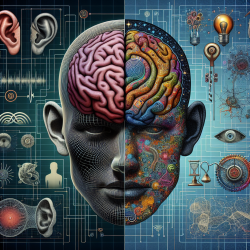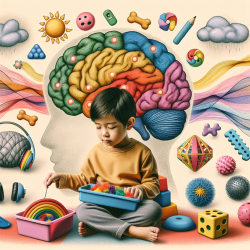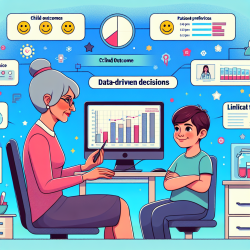Introduction
In the realm of speech-language pathology, understanding the intricate relationship between speech comprehension and cognitive processes is crucial. A recent study, "Associations between speech understanding and auditory and visual tests of verbal working memory: effects of linguistic complexity, task, age, and hearing loss," sheds light on how working memory influences speech understanding, particularly in individuals with hearing loss. This blog explores the study's findings and their implications for practitioners seeking to enhance their therapeutic strategies.
The Study in Focus
The study conducted by Smith and Pichora-Fuller (2015) examined the associations between speech understanding and working memory, considering factors such as linguistic complexity, task type, age, and hearing loss. Participants included younger adults with normal hearing and older adults with varying degrees of hearing loss. The research employed both auditory and visual working memory tests to assess their correlation with speech understanding measures.
Key Findings
- Working Memory and Speech Understanding: The study found that listening working memory span (LWMS) was more informative than reading working memory span (RWMS) for older adults with hearing loss. This suggests that auditory working memory tests might better reflect real-world listening challenges.
- Linguistic Complexity: The correlation between working memory and speech understanding was influenced by the linguistic complexity of the speech materials. More complex linguistic tasks required greater working memory resources, highlighting the need for tailored therapeutic approaches.
- Age and Hearing Loss: Significant differences were observed in working memory performance across age groups, with younger adults outperforming older adults. This underscores the importance of considering age-related cognitive changes in therapy.
Implications for Practitioners
For speech-language pathologists, these findings emphasize the importance of incorporating working memory assessments into therapeutic practices, especially for clients with hearing loss. Here are some practical steps to consider:
- Utilize Auditory Working Memory Tests: Implementing auditory-based working memory assessments can provide a more accurate reflection of a client's listening challenges in real-world scenarios.
- Adapt Therapy to Linguistic Complexity: Tailor therapeutic activities to match the linguistic complexity that the client can handle, gradually increasing complexity as their working memory capacity improves.
- Consider Age-Related Cognitive Changes: Be mindful of age-related cognitive changes when designing therapy plans, ensuring that they are appropriate for the client's cognitive abilities.
Encouraging Further Research
While this study provides valuable insights, it also highlights the need for further research to explore the nuances of working memory's role in speech understanding. Practitioners are encouraged to stay informed about emerging research and consider participating in studies that aim to refine therapeutic approaches.
To read the original research paper, please follow this link: Associations between speech understanding and auditory and visual tests of verbal working memory: effects of linguistic complexity, task, age, and hearing loss.










